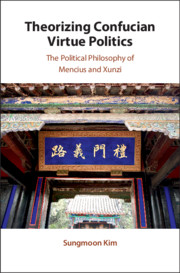Conclusion: Between Old and New
Published online by Cambridge University Press: 04 November 2019
Summary
In this book, I have examined how Mencius and Xunzi developed two different, though related, versions of Confucian virtue politics under new political circumstances ushered in by the rise of independent and sovereign states during the Warring States period. That is, I argued, in their struggle to adapt the Confucian paradigm of virtue politics to the political context of the warring states, which I have reconstructed as consisting of four key propositions – the virtue proposition, the virtue politics proposition, the moral education proposition, and the material condition proposition – they radically innovated the content of Confucian virtue politics while expanding its scope by developing political theories from their foundational assumptions of human nature (good or bad) and thus in a way very consistent with their contrasting accounts of moral self-cultivation (developmental or re-formational).
- Type
- Chapter
- Information
- Theorizing Confucian Virtue PoliticsThe Political Philosophy of Mencius and Xunzi, pp. 206 - 218Publisher: Cambridge University PressPrint publication year: 2019



